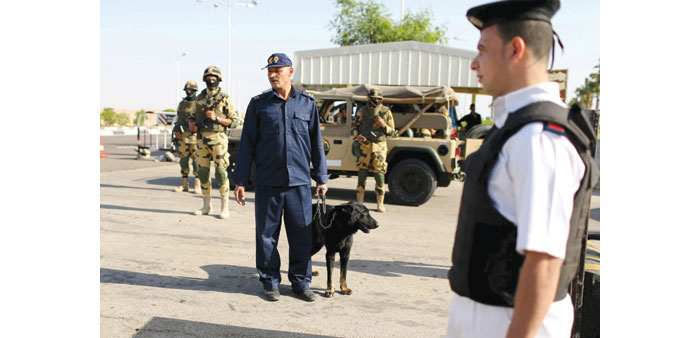Police inspects cars entering the airport of the Red Sea resort of Sharm El Sheikh yesterday. Egypt has suspended a $68mn, three-year global promotional campaign awarded to New York-based advertising agency J Walter Thompson Co, and cancelled events to launch it, according to Ahmed Hamdi, vice-president of the Tourism Promotion Authority.
Bloomberg
Cairo
Egypt last year spent millions of dollars splashing images of its ancient pyramids and beach resorts over London buses and billboards in New York to boost its vital but ailing tourist industry.
Foreign visitors put off by years of upheaval following the Arab Spring revolt were gingerly returning when an airliner packed with Russian holidaymakers smashed into the desert on October 31 after taking off from the Red Sea town of Sharm El Sheikh, killing all on board. Even if growing speculation that Islamists bombed the plane is eventually ruled out, the damage is already done, say tourism experts.
Russia has barred airlines from flying to Egypt, while UK carriers have had to stop flights to Sharm El Sheikh, as both nations look to bring thousands of stranded travellers home. France also stopped flights, while the Netherlands and Germany have urged their citizens to stay away.
Egypt suspended a $68mn, three-year global promotional campaign awarded to New York-based advertising agency J Walter Thompson Co, and cancelled events to launch it, according to Ahmed Hamdi, vice- president of the Tourism Promotion Authority.
The crash and subsequent travel warnings are “a catastrophic development” for Egypt, said Nadejda Popova, senior travel analyst at Euromonitor International. Travellers are likely to choose safer destinations like Dubai, Qatar, Abu Dhabi and Oman for their winter breaks, she said.
The Metrojet disaster is a major blow to President Abdel Fattah al-Sisi and his efforts to repair an image - and an economy - battered by political unrest, alleged human-rights abuses and violence. Critics accuse him of propagating instability with a sustained assault on Islamist opponents that has left hundreds dead and thousands in jail.
Tourism was supposed to be a major part of the turnaround. It generated $7.4bn in foreign currency in the fiscal year that ended June 30, according to central bank data. Visitor numbers, thought still well below the 2010 high of 14mn, were recovering: They reached nearly 10mn in 2014. Leading Egyptian businesses contributed to the cost of annual advertising campaigns, according to Al-Arabiya News and others.
“Every time we feel things are stable and the flow of tourists is recovering, a new incident occurs,” said Amani El-Torgoman, a board member of the Egyptian Tourism Federation. “There haven’t been any cancellations yet, but we expect the flow to slow down at least until people figure out what the cause of crash was.”
Militant attacks that surged after the army-led overthrow of former president Mohamed Mursi in 2013 have been mostly confined to the northern corner of Sinai, where the Islamic State local affiliate that claimed to have downed the Russian jet is based.
Still, there were incidents elsewhere. In September, Egyptian security forces accidentally killed seven Mexicans in the Western Desert after mistaking a group of tourists for fighters. In June, security forces averted a suicide bombing at the Temple of Karnak in the southern city of Luxor. Sharm El Sheikh has generally been regarded as safe.
About 3mn Russians holidayed in Egypt in 2014, the most of any nation, Popova said. The UK came next with 1mn. Last year, one in every five foreign visitors to Sharm El Sheikh was Russian.
Tourism Minister Hisham Zaazou said the decisions to suspend flights before the investigation into the Metrojet crash was over were unjustified, while Foreign Minister Sameh Shoukry said the UK was premature in announcing it thought a bomb was the likely cause. The result would be catastrophic for millions of Egyptians working in the tourism industry, he said.
At the World Travel Market in London, where he had planned to launch the new promotional campaign, Zaazou said that the government is still aiming for 20mn tourists a year by 2020. Egypt expected to welcome as many as 12mn in 2015, with revenues of $10bn.
It has recovered from terrorism before. The massacre of 58 tourists in Luxor in 1997 marked the height of an earlier Islamist insurgency, and the sector rebounded in just a few months, according to Nagui Erian, vice-president of the Chamber of Tourism Establishments, an association of business people who work in the industry.
“This time it’s different, it comes after five years of struggle,” he said. “Having said that, people who appreciate Egypt, its weather and historical treasures, would still come.”
Those treasures were going to be a focus of the now-abandoned advertising push, with antiquities authorities opening three 3,300-year-old tombs in Luxor to the public for the first time on Thursday.
Among those still willing to give Egypt a chance is 42-year-old British high school teacher John Watson, who was visiting the Egyptian Museum in Cairo.
“I’ve been coming every year over the last five years with my family, we were planning to go to Sharm but we cancelled upon hearing the news and we decided to go to Luxor instead,” Watson said. “Egypt is still my childhood fantasy.”

